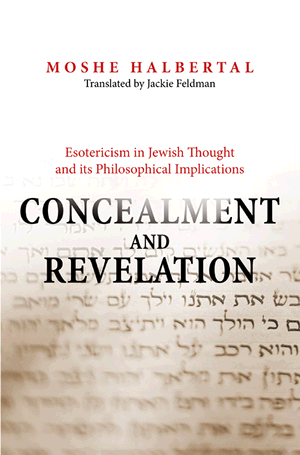You are here
Concealment And Revelation-Esotericism In Jewish Thought And Its Philosophical Implications (2007)
Primary tabs
| Size | Seeds | Peers | Completed |
|---|---|---|---|
| 578.97 KiB | 0 | 0 | 0 |
Concealment And Revelation-Esotericism In Jewish Thought And Its Philosophical Implications (2007)
Moshe Halbertal, Jackie Feldman (Translator)

During the twelfth and thirteenth centuries, great new trends of Jewish thought emerged whose widely varied representatives--Kabbalists, philosophers, and astrologers--each claimed that their particular understanding revealed the actual secret of the Torah. They presented their own readings in a coded fashion that has come to be regarded by many as the very essence of esotericism. Concealment and Revelation takes us on a fascinating journey to the depths of the esoteric imagination. Carefully tracing the rise of esotericism and its function in medieval Jewish thought, Moshe Halbertal's richly detailed historical and cultural analysis gradually builds conceptual-philosophical force to culminate in a masterful phenomenological taxonomy of esotericism and its paradoxes.
Among the questions addressed: What are the internal justifications that esoteric traditions provide for their own existence, especially in the Jewish world, in which the spread of knowledge was of great importance? How do esoteric teachings coexist with the revealed tradition, and what is the relationship between the various esoteric teachings that compete with that revealed tradition?
Halbertal concludes that, through the medium of the concealed, Jewish thinkers integrated into the heart of the Jewish tradition diverse cultural influences such as Aristotelianism, Neoplatonism, and Hermeticisims. And the creation of an added concealed layer, unregulated and open-ended, became the source of the most daring and radical interpretations of the tradition.
Contents:
Acknowledgments ix
A Note on Editions Used xi
Introduction 1
Chapter 1
The Paradox of Esotericism: “And Not on the
Chariot Alone” 8
Chapter 2
The Hidden and the Sublime: Vision and Restriction in the
Bible and in Talmudic Literature 13
Chapter 3
The Ethics of Gazing: The Attitude of Early Jewish
Mysticism Toward Seeing the Chariot 18
Chapter 4
Concealment and Power: Magic and Esotericism in the
Hekhalot Literature 28
Chapter 5
Esotericism and Commentary: Ibn Ezra and the
Exegetical Layer 34
Chapter 6
Concealment and Heresy: Astrology and the Secret
of the Torah 44
Chapter 7
Double Language and the Divided Public in
Guide of the Perplexed 49
Chapter 8
The Breaching of the Limits of the Esoteric: Concealment
and Disclosure in Maimonidean Esotericism 60
Chapter 9
From Transmission to Writing: Hinting, Leaking,
and Orthodoxy in Early Kabbalah 69
Chapter 10
Open Knowledge and Closed Knowledge: The Kabbalists of
Gerona—Rabbi Azriel and Rabbi Ya’akov bar Sheshet 77
Chapter 11
Tradition, Closed Knowledge, and the Esoteric: Secrecy
and Hinting in Nahmanides’ Kabbalah 83
Chapter 12
From Tradition to Literature: Shem Tov Ibn Gaon
and the Critique of Kabbalistic Literature 93
Chapter 13
“The Widening of the Apertures of the Showpiece”:
Shmuel Ibn Tibon and the End of the Era of Esotericism 105
Chapter 14
Esotericism, Sermons, and Curricula: Ya’akov Anatoli
and the Dissemination of the Secret 114
Chapter 15
The Ambivalence of Secrecy: The Dispute over
Philosophy in the Early Fourteenth Century 120
Chapter 16
Esotericism, Discontent, and Co-Existence 135
Chapter 17
Taxonomy and Paradoxes of Esotericism:
Conceptual Conclusion 142
Notes 169
Index 191
About the Author:
Moshe Halbertal is professor of philosophy at the Hebrew University of Jerusalem, a fellow at the Shalom Hartman Institute, and the Gruss Professor at New York University Law School. He is the author of People of the Book and the coauthor (with Avishai Margalit) of Idolatry.
Publisher: Princeton University Press (2007)
ISBN: 0691125716
ENJOY!!! :D
- Log in to post comments
